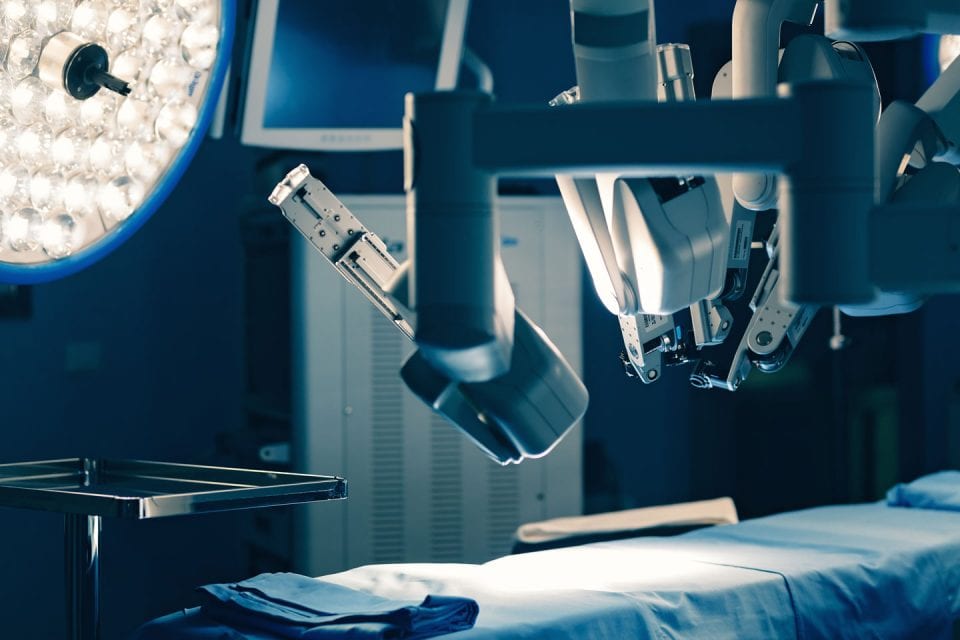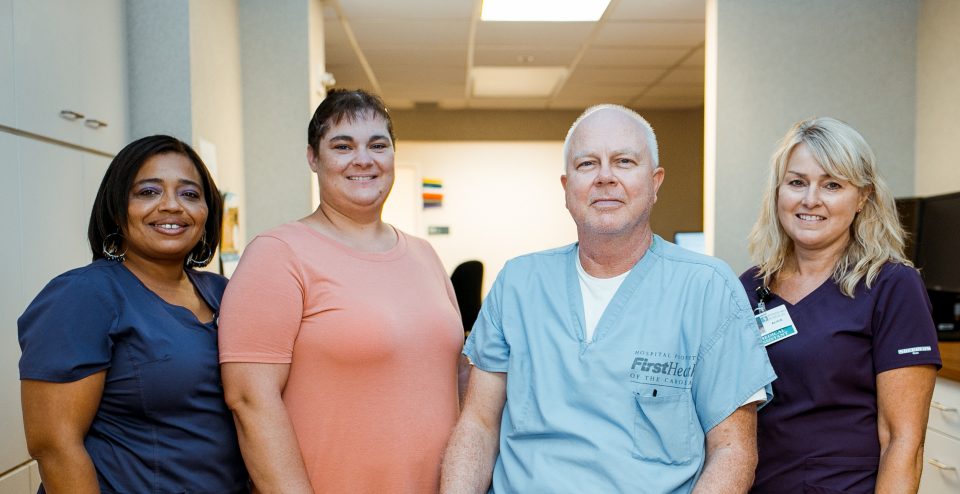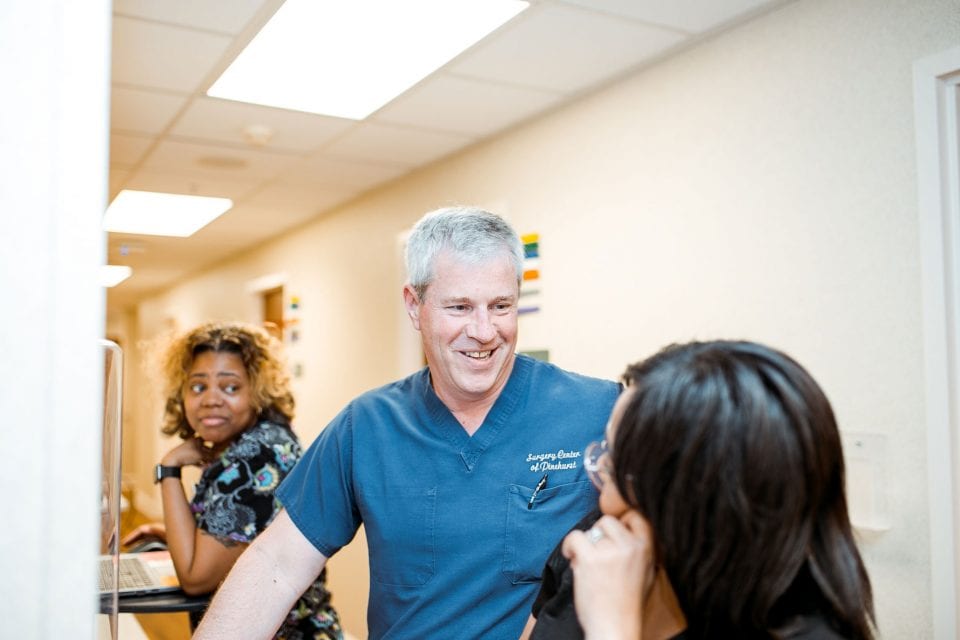Prostate Cancer
Approximately 220,000 new cases of Prostate Cancer are diagnosed annually per year per the American Cancer Society. One in seven men will be diagnosed with Prostate Cancer in their lifetime. The average of age of diagnosis is 66.
Your health is very important to all of us at Pinehurst Surgical Clinic Urologic Surgery. Equally important to us is your confidence in us and your knowledge that our expertise, experience, and caring will make the time you spend with us comfortable and productive.
This information is to help you better understand prostate cancer and have an informed discussion with your provider.
What is the prostate?
The prostate gland is part of the male reproductive system. Its main purpose is to produce fluid for semen, which transports sperm during ejaculation.
The prostate is the size of a walnut and is located in front of the rectum, just below the bladder. It wraps around the urethra, the tube that carries urine from the bladder out through the tip of the penis.
Prostate cancer
Prostate cancer is a malignant tumor that begins growing in the prostate gland. It is one of the most common types of cancer diagnosed in American men. It is estimated that about 220,000 new cases of prostate cancer are diagnosed annually in the U.S.
What are the symptoms?
When a prostate tumor begins to grow, it usually does not cause symptoms. As it spreads, it eventually puts pressure on areas such as the urethra and may block the fluid of urine from the bladder and cause other urinary problems. These are usually the first symptoms of prostate cancer. If untreated, it can spread to nearby lymph nodes, bones or other organs and may cause aches and pains in the pelvis, hips, ribs, back and other bones.
Dr. Chamberlain, one of our valued urologic surgeons at Pinehurst Surgical Clinic. He discusses testing and symptoms of prostate cancer.
Symptoms of prostate cancer may include:
- Frequent urination (especially at night)
- Weak urinary stream
- Inability to urinate
- Interruption of urinary stream (starting and stopping)
- Pain or burning during urination
- Blood in the urine
- Pain in lower back, pelvis or upper thighs
Who is at risk for prostate cancer?
While we still do not know exactly why prostate cancer occurs, we do know that some risks factors include: age, race, environment, diet, genetics and family history.
- About 56 percent of all prostate cancers are diagnosed in men 65 years of age and older.
- About 1 in every 5 African-American men will be diagnosed with prostate cancer.
- African-American men have a death rate two times that of Caucasian men, and therefore having earlier discussions with their doctor (beginning at age 45) is recommended.
What are the two initial tests that help diagnose prostate cancer?
Healthcare providers routinely use prostate-specific antigen (PSA) and digital rectal exam (DRE) for the screening and preliminary diagnosis of prostate cancer. Professional organizations vary in their recommendations about who should – and who shouldn’t – get a PSA screening test.
The American Cancer Society says the talk about screening should begin at 50 for patients with normal risk or 45 for patients at high risk (i.e. African-American or a family history of prostate cancer). The decision to screen for prostate cancer should be an individualized decision between patients and their urologist.
What is a PSA?
Prostate-specific antigen (PSA) is a substance made by cells in the prostate gland and is mostly found in semen, but a small amount is also found in the blood. Most healthy men have levels under 4 ng/ml. The chance of having prostate cancer goes up as the PSA level goes up. The PSA level can also be increased by things other than prostate cancer, such as an enlarged prostate. If your PSA level is high, your doctor may advise either waiting awhile and repeating the test, or getting a prostate biopsy to find out if you have cancer.
What is a Biopsy?
During a biopsy, a needle is used to remove a small amount of prostate tissue. The tissue is then examined under a microscope to see if cancer cells are present. A biopsy is the ONLY test that definitively confirms prostate cancer.
Below is some general information links and treatment options Pinehurst Surgical Clinic Urology Providers use to treat prostate cancer.
Surgery for Prostate Cancer
- DaVinci (Robotic) Prostatectomy
- Radiation for Prostate Cancer
- Cryotherapy for Prostate Cancer
- Chemotherapy for Prostate Cancer
- Hormone Therapy for Prostate Cancer
da Vinci® Surgery for Prostate Cancer
With the da Vinci® Surgical System, surgeons operate through just a few small incisions.
Other Treatment Options
Prostate cancer is a malignant tumor that begins growing in the prostate gland.
Schedule An Appointment
Make an appointment with one of our urologic surgery specialists today.
Our Urologic Surgeons
Our board-certified Urologists of Pinehurst Surgical Clinic are ready to step in and provide world class medical care for all surgical needs.
n
Pinehurst Surgical Clinic is a multi-specialty clinic comprised of ten specialty centers located in a state-of-art surgical facility in Pinehurst, NC. Our Board certified Urologists offer safe, thoughtful treatment for all types of Urologic diseases. For more information, please call 910-295-6831.






